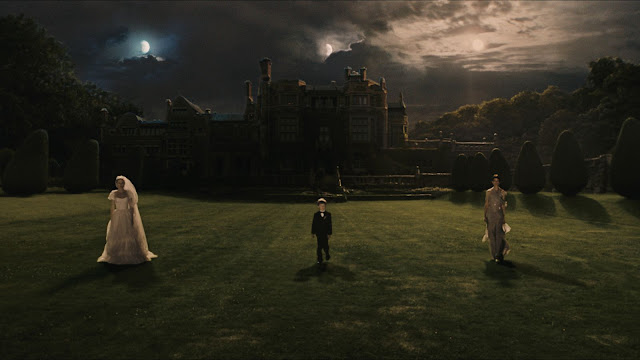Country: Denmark/Sweden/France/Germany
Year: 2011
Language: English
Runtime: 135 minutes
Many of you who have seen Lars von Trier's notoriously disturbing "Antichrist" are probably curious to find out exactly in what direction the director is headed with his films. Does his latest effort, "Melancholia", measure up to his other work? Does he explore new terrains here or does he continue to aim for the usual edginess seen in his most controversial crafts? Answers to these questions can be found in what's written below. So, you kind of have no other choice but to read on...
The opening sequence of the film is magical and sublime. Lars von Trier toys with our minds by making us sit through what appears to be a series of insignificant, nonlinear shots; simple bits and pieces arranged in a dreamlike progression. There is no dialogue or sound in this sequence, but rather powerful classical music (Wagner's "Tristan und Isolde") that does a swell job accompanying some of the most gorgeous slow-motion photography I have ever seen. Lars is teasing us with all of these nonsensical shots; this spectacular, operatic prologue is really just a sneak-peek or preview, setting the tone for all the bizarre sights we will soon come to discover in this motion picture. Did this opening ever blow me away! And you should have seen the faces of the other audience members throughout these first 10 minutes! Most of them looked as bewildered as any human being would be while watching the famous ending of Stanley Kubrick's "2001: A Space Odyssey".
If you've seen a Lars von Trier film before, you probably have a pretty good idea of what his style is when it comes to composing shots. When he isn't shooting in slow-motion, he employs his trademark Dogme 95 influenced unsteady, "moving camera" cinematography, with tight close-ups and recurrent jump cuts that make for more of a mesmerizing, absorbing cinematic experience. If you're new to the man's work-- and especially if you're a fan of smooth, subtle shots-- you'll probably be irritated by this. But trust me, this unique filmmaking vision should grow on you with time-- or rather, with more viewings of his movies. (Come to think of it, the only gliding shots I can remember are the helicopter shots of Justine and Claire horseback riding on a beautiful, foggy, countryside road.)
"Melancholia" is breathtakingly beautiful all throughout. Most of it is shot on location in what must be Denmark, Sweden, France, or Germany (how am I supposed to know in which country it was filmed!). But somehow, in these natural conditions, the lighting is able to be fiddled around with to achieve an aesthetic brilliance nearly unmatched by any other film. I can recall the particular beauty of the nighttime scenes shot outside of the estate, where the tall, trimmed hedges cast a line of shadows over the well manicured lawn. The first thing that came to mind then was Alain Resnais' "Last Year at Marienbad". Furthermore, it's obvious that a fair deal of CGI was used to transform the landscape and atmosphere (mostly the sky) into something out-of-this-world, yet it's so well done you wonder how anyone could have accomplished such visual perfection.
On to matters of greater importance (at least, in your eyes): the acting! Is it possible to describe how mind-blowing Kirsten Dunst's performance is? Perhaps it isn't, but I'll give it my best shot. I've never been much of a fan of her work, but by the end of this film, I had a new appreciation for this fine, young actress. I think she owes credit to her director, though, because obviously it isn't a coincidence that he always gets the most outstanding performances out of his female leads. For the first part of the film, you really get to see Justine's level of emotional vulnerability thanks to Dunst's spot-on portrayal of her character. I think she gets better as the film progresses into the second part, though. When she plays a woman in a state of deep depression, you could swear she was actually going through a hard patch in real life. She makes her character feel so apart from the rest of humanity; so aware of things that she has purposely disconnected herself from reality. I wouldn't be surprised if she snagged an acting nomination at the upcoming Academy Awards.
As for the rest of the cast-- I'm not just saying this to sound proper-- everyone does a fine job at getting into character. Some remarkable performances would be from Alexander Skarsgard as the husband who isn't quite familiar with his wife's distant attitude, Charlotte Gainsbourg (who would be the runner-up to Dunst in my book) as Justine's loving, nervous wreck of a sister, and Kiefer Sutherland as Claire's continuously aggravated husband, who happens to be the one to deliver all the comic relief in the film. Even the actors and actresses I didn't name have glowing performances in the film. "Melancholia" could almost be placed alongside "Network" and "Who's Afraid of Virginia Woolf?" for having some of the best acting from an entire cast.
"Melancholia" is a one-of-a-kind, visionary film that uses gripping storytelling to keep the audience on the edge of their seat. It manages to be an extremely intense, sensational movie-watching experience without relying on the same old formula of most apocalyptic films. I love how it doesn't get too caught up in its own imagined version of the end of the world, but instead chooses to focus on subjects involving humans in a much smaller, deeper, and more personal scale (such as the troubles of dysfunctional families). This is without a doubt one of Lars von Trier's greatest works, as well as one of my favorite films of the year. Very highly recommended.
Four stars out of four.
EXCELLENT






